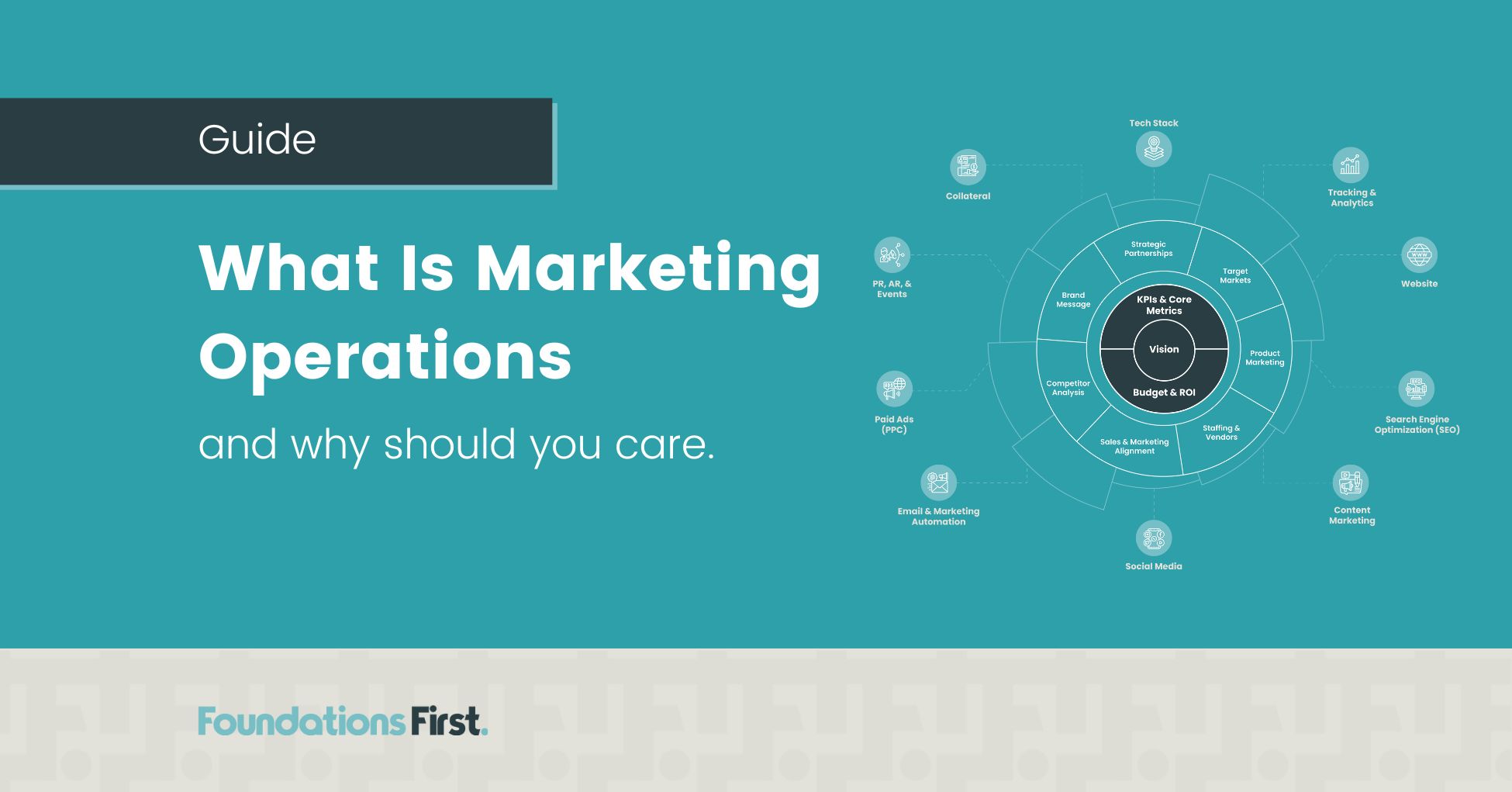What Is Marketing Operations And Why Should You Care?

Key Takeaways
- Marketing operations, or MOps, refers to the elements that drive the success of marketing activity, including people, technology, data, and processes.
- MOps ensures marketing efforts are efficient, results-oriented, and tied to business outcomes.
- A marketing operations framework helps cut costs, eliminate inefficiencies, and improve return on investment (ROI).
- Cohesion in marketing efforts is achieved by implementing a MOps framework, ensuring teams collaborate and resources are shared effectively.
- A data-driven approach is central to MOps, consolidating data for analysis and gaining valuable insights for future strategies.
- The right marketing operations approach keeps your marketing lean, maximizing results while managing spending efficiently.
- Data silos and overlapping marketing tech can lead to wasted resources and ineffective campaigns, which MOps can address and streamline.
- Without a central operational framework, marketing efforts can become scattered, resulting in inconsistent branding and wasted efforts.
- Implementing a MOps framework introduces a holistic approach to marketing, leading to improved productivity and better results.
Every organization needs a solid marketing strategy to thrive. The world is a noisy place and consumers are bombarded with marketing messages at every turn. Having a marketing plan alone is not enough to help your business cut through all the commotion and reach your target audience. You need to work a little smarter – this is where marketing operations come into play.
But what does the term marketing operations mean? More importantly, why should you care?
Take a look at the benefits this holistic approach to marketing will bring to your business and see what happens when you don’t consider your marketing operations needs.
What is marketing operations?
Let’s clarify what marketing operations actually is. Marketing operations, or MOps, refers to all the elements that come together to drive the success of marketing activity. The marketing operations function is made up of the people, technology, data, and processes that underpin marketing campaigns. Basically, all the things that happen behind the scenes to ensure marketing efforts are successful when planning and delivering a marketing campaign can be described as marketing operations.
When most people think of a marketing team, they picture a bunch of creative people. Maybe a content creator, an SEO specialist, a social media manager, a brand manager, and a product manager. Each of these people may be really talented and great at their job, but if no one is there to oversee their work, they’re probably not truly effective.
A MOps framework ensures all the tactics and strategy that go into marketing an organization deliver results. So, if the creative team are the ideas people, the marketing operations framework ensures these ideas translate into measurable results in the most efficient way possible.
What does a marketing operations framework do?
Gartner describes marketing operations as follows: “The vision for a marketing operations function is to improve the efficiency and effectiveness of marketing across people, processes, technologies, and data to achieve desired business outcomes.”
In practice, this means that marketing operations takes a holistic approach which leverages all the different aspects of marketing activity, brings them together, and ensures they deliver optimum results. In this sense, MOps is the bridge to the executive suite.
MOps ensures your marketing efforts aren’t viewed in isolation. By moving away from an insular approach and viewing the bigger picture, MOps spots gaps in efficiency and opportunities to maximize results and deliver improved ROI.
The marketing operations role is expansive; this is how a framework is able to show the bigger picture and drive efficiency and results. Here are the main functions of MOps framework:
- Developing workflow processes to boost efficiency
- Measuring performance
- Performance reporting
- Data management
- Data analysis
- Campaign analysis
- Strategic planning
- Project management
- Campaign management
- ROI calculations
- Budget setting and control
- Analysis of competitors
- Market intelligence
- Customer research
- Introducing and implementing marketing software and technologies
This operational role helps ensure the efforts of the marketing team are A) as efficient as possible and B) deliver the best possible results.
Why does marketing operations matter to your business?
You’re probably paying a significant chunk of money each year on marketing and there’s a good chance you’re spending too much. The problem is you may not be seeing any actual results to justify your spending.
A lot of businesses (and marketing departments) believe that the best way to boost their marketing results is to dump more money into marketing. Some companies will outsource – or avoid outsourcing – without really knowing how or why. Keep in mind that spending more does not always translate into improved results; it just means you are parting with more cash. The only way to make your marketing efforts more effective is by taking a holistic approach. Rethinking your marketing efforts and moving beyond creativity into a more operational role is the answer. Taking this approach will not only deliver better results but will also put an end to unnecessary spending and wasted resources.
If you want your marketing efforts to be more productive, more efficient, deliver a better ROI, and cost less overall, you need marketing operations.
Are you ready to outsource your social media? Download our no-nonsense guide to avoid wasting your cash flow.
Why does marketing operations keep your marketing lean?
The past few years have been rough for businesses (yes, COVID, we’re looking at you). Now with a looming recession, organizations need to reassess their spending and trim the fat. One area of your business that needs to be lean is your marketing.
A lean marketing approach delivers a wealth of benefits, one of the main ones being a practical way to cut your marketing costs. But it can also do so much more than that.
So, how does a marketing operations approach differ from the way that ‘normal’ marketing functions? Well, it may sound like a subtle difference, but it is actually pretty significant. In fact, it’s so significant that it can make the difference between marketing campaigns that drive business growth and deliver an impressive ROI, and expensive campaigns that lose you money.
MOps moves beyond the usual scope of a traditional marketing team. Having a marketing operations framework ensures there is a process taking care of the strategic side of your marketing efforts to ensure every activity maximizes results while managing spending in the most efficient way. Basically, MOps keep your marketing lean and effective. Talk about a win-win!
Marketing operations brings cohesion to your marketing efforts across your organization.
Having a marketing operations framework in place helps connect the dots. We see disjointed marketing efforts in companies all the time. When different areas of the marketing team work on individual projects without communicating with each other, you end up with no cohesion in your marketing and a huge waste of time and money. Instead of working together to reach a common goal, everyone is pulling in different directions.
Need a marketing department check-up? Download our PDF to get started.
An operations approach cuts marketing costs.
Without a holistic approach to your marketing efforts, your campaigns will not only be inconsistent, but they will also be expensive. When different teams are carrying out different activities, you waste time and money.
A MOps framework driving all marketing activities changes everything. Teams start to collaborate, campaigns become better organized, and people begin to start sharing resources. The result? You stop pouring money down the drain.
A data-driven approach is central to a good marketing operations framework.
Let’s face it. Hard data should always be the foundation of your marketing department.
The MOps framework brings together previously fragmented data and consolidates it so it can be analyzed and used to gain solid insights. Carrying out a review of where data is stored and what data is available is the first step to take and will provide the groundwork for a data-driven approach. These data-driven insights will then form the basis for campaigns and strategies and ensure that they achieve maximum results.
No more bloated, expensive software tech stacks with operations oversight.
Your choice of software is crucial when taking a holistic view of marketing and introducing a marketing operations approach. The right software will ensure that data is used effectively and will prevent it from becoming fragmented. By streamlining the use of software, and choosing software that best suits the needs of the business, marketing operations processes help cut costs and improve efficiency.
Paying subscriptions for multiple software applications and having your data stored in multiple places is a waste. MOps can assess software options and find a solution that allows integration and makes data accessible.
Ready to audit your tech? Download our Tech Stack worksheet to get started.
A marketing operations focus means a focus on efficiency, improved results, and increased ROI.
Creating campaigns and producing all the content that is required to launch on time is no easy task. Many marketers feel like time is one resource that they are significantly lacking. A lack of time = a lack of analyzing results.
Your marketing team can’t step back and reflect when they’re working at full capacity against the clock to deliver a campaign on time and then immediately begin working on the next project. This means the results aren’t being reported as well as they should be. You can’t calculate a thorough ROI this way.
Being unable to analyze the effectiveness of a campaign can also mean that you’re lacking vital insights to develop your future strategy. Having a MOps framework to guide the ROI calculations and analyze campaign results not only helps to measure effectiveness but also helps guide your future marketing activity.
What happens when you don’t consider your marketing operations needs?
Still unsure whether you need a marketing operations framework to help make your marketing a lean, well-oiled machine? Here is what happens when you don’t consider your marketing operations needs:
Data silos turn data into untrusted noise.
Without MOps to oversee the bigger picture, the management, or rather mismanagement of data, often becomes a major issue. Your data is one of your business’s biggest assets. Not using it effectively puts your business at a serious disadvantage.
Valuable data that is packed with marketing insights may be scattered across numerous software programs and under the control of different areas of your business. With all these data silos, it is impossible for you to organize, manage, and actually do anything useful with your data. You need to deal with this issue. Fast.
One of the easiest places to cut costs is in your tech stack. One subscription here and another there add up quickly. Especially when each team uses their favorite program without considering the company’s existing platforms. We also see teams wanting to ring-fence their own data and not share it with other internal stakeholders.
Data silos can exist for many reasons, but they all lead back to one underlying issue: the lack of a marketing operations framework to guide data management and the use of the software.
The Marketing Operations Solution:
MOps carries out an assessment of the software programs where your data is stored. Following the assessment, the software is implemented that allows for integration across all data silos and redundant platforms that duplicate efforts are removed.
The Result:
Data is no longer fragmented and is housed in one place to guide future marketing decisions.
Too much money is spent on overlapping marketing tech.
When a business has too many software platforms, chances are that some of them are entirely unnecessary. If your company is using several of these platforms, you’re wasting money. Why dump a chunk of your marketing budget into three separate programs when one will do?
In the current economic climate, many people are concerned about job security and the chances of being let go. No one wants to be seen as expendable, so to remedy this, employees may seek ways to make their job seem more valuable than it is and overstate its importance within the team. While self-preservation is understandable, it can create issues. If there is no one (or no framework) guiding the marketing team on an operational level, budget and resources can become wasted by people creating work for the sake of looking busy.
The Marketing Operations Solution:
MOps drive efficiency by monitoring activity and allocating resources accordingly. With marketing operations setting and monitoring the budget, spending is only approved where there is a business need.
The Result:
Marketing spend is focused on activities that deliver the highest ROI, and spending is closely monitored. This enables accurate budgets to be set, and overspending is eliminated.
Your marketing activities get scattered without a central operational framework.
When there is no one overseeing the team on an operational level, your marketing is going to be scattered. You’ll end up putting too many campaigns into action at once, seeing inconsistencies in the branding and message, and spending too much money. This means that a lot of time and effort is wasted on ineffective marketing, and too much money is spent on campaigns that will never deliver a healthy ROI.
The Marketing Operations Solution:
With a carefully planned marketing strategy in place and closely managed campaigns in operation, all marketing efforts will be consistent and cohesive.
The Result:
Improved productivity as everyone understands what they are working on, and no confusion regarding tasks. All marketing activities are based on concrete data and are executed in line with the business’s brand.
Think you have cracks in your marketing foundation? Check out our ebook!
If you are tired of spending too much money on your marketing without seeing a healthy return on your investment, now is the time to take action.
A MOps framework will change the structure of your marketing setup and introduce a holistic approach. By looking at the bigger picture and introducing an operational approach, all the smaller pieces of your marketing setup will start to fall into place. So, what are you waiting for?
Want more templates, guides, tutorials, training, and guidance? Join Foundations First Marketing Academy for access to all of our templates, training, and a whole lot more.
Learn More About the Academy
Michelle Tresemer
Categories
- Analytics and Measurement
- Brand Messaging
- Competitor Analysis
- Content Marketing
- Digital Marketing Strategy
- Digital PR & Events
- Marketing Budgets
- Marketing KPIs
- Marketing News
- Marketing Rock Samples
- Marketing Staffing & Vendors
- Marketing Strategy
- Marketing Tech Stack
- Podcast
- Product Marketing
- Sales Marketing Alignment
- SEO
- Social Media
- Strategic Marketing Partnerships
- Target Markets
- Uncategorized
- Vision & Purpose
- Webmaster








